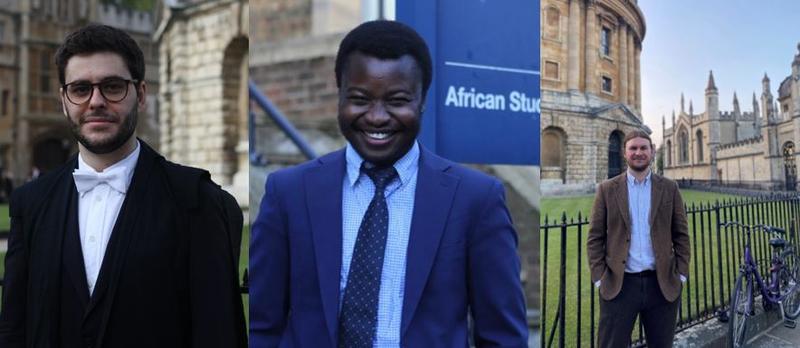
Rafael Hernández, Jacob Alhassan, Jorich Loubser
Rafael Hernández wins the Kirk-Greene Prize for the best overall performance on the MSc in African Studies
I graduated from the MSc in African Studies in 2021. At Oxford, my dissertation research focused on regional approaches to transitional justice as viable responses to transnational violence. Through a comparative study of transitional justice in West Africa and South America, I explained how state-level, often pre-existing, truth-telling and justice mechanisms have reached beyond state boundaries to successfully bring about ‘regional’ outcomes of transitional justice without recourse to exceptional institutional solutions demanded in past literature. The MSc was a wonderful opportunity to dip my toes into the academic world where I hope to return as a PhD candidate after working for a few years. I was taught by brilliant scholars and engaged with key topics that contributed great depth to my knowledge and understanding. Despite the limitations of the pandemic world, I was still able to form lasting and valuable connections with students and faculty both within and outside the African Studies Centre.
Jacob Alhassan and Daisy Pullman jointly win the Terence Ranger Prize for an outstanding dissertation performance
Where is the Pain? A Critical Analysis of Ghana’s Tramadol ‘Crisis’
The thesis critically explored the rise in tramadol consumption in Ghana and moralising discourses used by the government and other stakeholders to demonise tramadol users. It reveals the need to attend to structural causes of drug use among urban youth in Ghana.
Jorich Loubser wins African Studies Prize for excellent dissertation research
My research aims to extend our understanding of the political economy of Africa's mining sector. Utilising Botswana and South Africa as my principal case studies I argue that the central economic relationship in post-colonial Africa, in so far as it determines the varied forms of countries' integration in global systems, remains the relationship between the state and transnational capital. By investigating state-capital negotiations I illustrate that Botswana has mainly attempted to increase government revenue from mining, while post-apartheid South Africa has driven new forms of elite accumulation (through BBEEE) while improving labour regulation. I argue these different approaches are explained by domestic factors, including state development and the structure of elite coalitions. I intend to expand on this research during my PhD research at LSE.